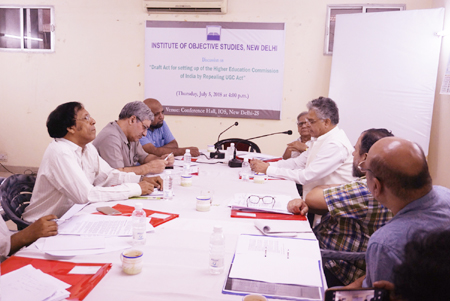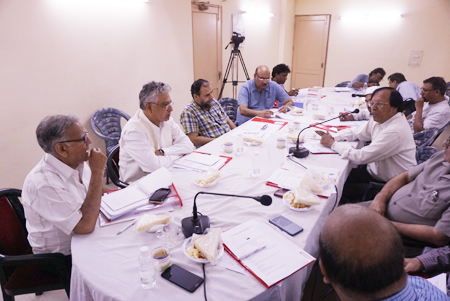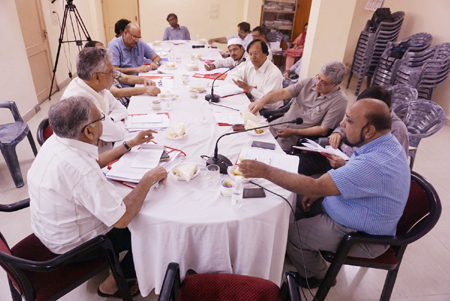IOS Discussion on Higher Education Commission of India Bill, 2018
July 5, 2018 at Institute Building, 162, Jogabai, Jamia Nagar, New Delhi

A discussion on the Draft Act for setting up of a Higher Education Commission of India by replacing the UGC Act, was organised by the Institute of Objective Studies at its conference hall on July 5, 2018. The participants in the discussion felt that there appeared to be no perceptible reason or need to replace the old panel to grant recognition to new universities and other institutions of higher learning and research as well as allocate funds to them.
It may be recalled that the Ministry of Human Resource Development, Government of India, had uploaded a draft Act on its website, inviting educational institutions, stakeholders and the general public to furnish comments on the draft Bill by July 7, 2018. The speakers at the discussion felt that the time made available to stakeholders was insufficient giving rise to the speculation that the passage of the proposed Act was a foregone conclusion. Probably, the government had made up its mind to pilot the bill in Parliament without allowing proper time and opportunity to discuss the draft threadbare and arrive at a consensus, they opined.
Participants unequivocally raised the question of the time given to stakeholders to send in their suggestions. While the ministry issued a press release on June 27, the last date for receiving suggestions was July 7, 2018. This was well-nigh impossible to ascertain the views of academics, experts and those working in the field of higher education in such a short time. They were of the view that the issue must have been thoroughly discussed at universities and other such institutions.

They also felt that owing to summer vacations in educational institution, a large number of teachers and students could not have used the internet to express their views on the proposal. By and large, the participants were of the view that the proposed law had several loopholes which had not been plugged. A major point that came up for discussion was the provision to divest the UGC of the power to allocate funds to universities. This was a major departure from the practice that would render the education regulator rudderless. Moreover, the power of funding was being vested with the ministry of human resource development without outlining the mechanism to determine the need of each institution.
Another point which was debated in detail was the mode of selection of the chairman and other members of the Higher Education Commission. The draft Act was also silent over the qualification of the members of the panel. This gave rise to the apprehension that the private sector would be given entry into the field of higher education, making it more difficult for the lower strata of society and lower income groups to pursue higher education. Participation of the private sector in higher education sector was fraught with risk to the education system. The participants expressed the apprehension that the government was planning to end autonomy of universities, which was essential for teaching and research, and take full control of educational institutions.

The participants were clueless about the flaws in the existing commission and the features of the new panel to rectify them. They viewed it as an attempt to rush through the bill in haste, without consulting experts in the field. The intent of the government was suspect and signaled its will to handle the affairs of higher educational institutions as per its whim. They feared that the move would deal a serious blow to higher education and adversely affect the career of students.
While the Secretary General, IOS, Prof. ZM Khan, presided over the deliberations, Prof. M. Afzal Wani, Asstt. Secretary General, conducted the proceedings and proposed a vote of thanks. The discussion began with the recitation of a Quranic verse by Hafiz Akhtar Husain Nadwi.
Those who participated in the discussions included Prof. M. Aslam, ex-Vice-Chancellor, IGNOU, Prof. Furqan Qamar, former Vice-Chancellor, Central University of Himachal Pradesh, Kangra, Prof. Ishtiyaq Danish, ex-HoD, Deptt. of Islamic Studies, Jamia Hamdard and Finance Secretary, IOS, Dr. Tanveer Eijaz, Associate Prof. and fellow, Ramjas College, DU, Dr. MD Thomas, Founder-Director, Institute of Harmony and Peace Studies, Dr. Khalid Mahmood Ansari, Secretary, Indian Institute of Natural Resource Management (IINRM), Noida, social activists-VB Rawat and Vijay.
It is noteworthy that, in a move to scrap the university Grants Commission Act, 1956, and replace it with the Higher Education Commission of India Act, 2018, the ministry of human resource development, had invited suggestions from stakeholders. The IOS held the meeting of the experts in education, academics, administrators, members of the civil society and prominent citizens to elicit their views, and forward them to the Government of India for consideration.
Go Back